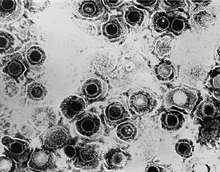Oncolytic herpes virus
This article needs more primary sources. (March 2013) |  |
Parts of this article (those related to HSV1716 clinical trials) need to be updated. (September 2015) |
| Oncolytic herpes virus | |
|---|---|

| |
| TEM micrograph of a herpes simplex virus. | |
| Virus classification | |
| (unranked): | Virus |
| Realm: | Duplodnaviria |
| Kingdom: | Heunggongvirae
|
| Phylum: | Peploviricota |
| Class: | Herviviricetes |
| Order: | Herpesvirales |
| Family: | Orthoherpesviridae
|
| Genus: | Simplexvirus |
| Species: | Human alphaherpesvirus 1
|
Many variants of

HSV1716
HSV1716 is a first generation
A vital part of the normal mechanism of HSV-1, the ICP34.5 protein has been proposed to condition
An HSV1716 variant, HSV1716NTR is an oncolytic virus generated by inserting the enzyme
Clinical trials
- High grade glioma: Three phase I trials have been completed and two phase II trials are in preparation.[6][7]
- Squamous cell carcinoma of head and neck: A phase I trial has been completed.[8]
- Malignant melanoma: A phase I trial has been completed.[9]
- Hepatocellular carcinoma: A phase I/II trial is in preparation.
- Malignant pleural mesothelioma: A phase I/II trial is in progress.[10]
- Non-CNS pediatric cancer: A phase I trial is in progress.[11]
G207
G207 was constructed as a second-generation vector from HSV-1 laboratory strain F, with ICP34.5 deleted and the ICP6 gene inactivated by insertion of the E. coli
Two phase I clinical trials in glioma were completed.[13][14][15] The results of the first trial were published simultaneously with the first trial of HSV1716 in 2000, with commentators praising the demonstration of safety of these viruses when injected into brain tumours but also expressing disappointment that viral replication could not be demonstrated due to the difficulty of taking biopsies from brain tumours.[16]
NV1020
NV1020 is an oncolytic herpes virus initially developed by Medigene Inc. and licensed for development by Catherex Inc. in 2010.
Clinical trials
A Phase I/II study completed in 2008 evaluating NV1020 for treatment of metastatic
Talimogene laherparepvec
Talimogene laherparepvec is the USAN name for the oncolytic virus also known as 'OncoVEX GM-CSF'. It was developed by BioVex Inc. (Woburn, MA, USA & Oxford, UK) until BioVex was purchased by Amgen in January 2011.[21]
It is a second-generation
Deletion of the gene encoding ICP47 also puts the US11 gene (a late gene) under control of the immediate early ICP47 promoter. The earlier and greater expression of US11 (also involved in overcoming PKR-mediated responses) largely overcomes the reduction in replication in tumor cells of ICP34.5-deleted HSV as compared to wild type virus, but without reducing tumor selectivity.- Clinical trials
Including phase III : See Talimogene laherparepvec
See also
References
- ^ PMID 12522436.
- ^ PMID 8887567.
- ^ S2CID 11464646.
- PMID 19528476.
- PMID 22414636.
- S2CID 14604628.
- PMID 11960316.
- S2CID 43914133.
- S2CID 34442464.
- ^ Clinical trial number NCT01721018 for "Intrapleural Administration of HSV1716 to Treat Patients With Malignant Pleural Mesothelioma" at ClinicalTrials.gov
- ^ Clinical trial number NCT00931931 for "HSV1716 in Patients With Non-Central Nervous System (Non-CNS) Solid Tumors" at ClinicalTrials.gov
- S2CID 8712053.
- PMID 10845725.
- ^ Clinical trial number NCT00028158 for "Safety and Effectiveness Study of G207, a Tumor-Killing Virus, in Patients With Recurrent Brain Cancer" at ClinicalTrials.gov
- ^ Clinical trial number NCT00157703 for "G207 Followed by Radiation Therapy in Malignant Glioma" at ClinicalTrials.gov
- PMID 10845717.
- ^ "MediGene AG divests Oncolytic Herpes Simplex Viruses (oHSV) program to Catherex, Inc" (Press release). MediGene AG. April 13, 2010. Archived from the original on October 29, 2013. Retrieved May 7, 2013.
- ^ PMID 20486770.
- ^ Clinical trial number NCT00149396 for "Safety and Efficacy of a Genetically Engineered Herpes Simplex Virus NV1020 to Treat Colorectal Cancer Metastatic to Liver" at ClinicalTrials.gov
- PMID 21895536.
- ^ "Amgen, Form 8-K, Current Report, Filing Date Jan 26, 2012" (PDF). secdatabase.com. Retrieved Jan 8, 2013.
- ^ "OncoVEXGM-CSF RAC Submission" (PDF). NIH Genetic Modification Clinical Research Information System (GeMCRIS®). Archived from the original (PDF) on 28 May 2010. Retrieved 1 April 2013.
- S2CID 30005391.
- PMID 22116674.
- S2CID 11220164.
